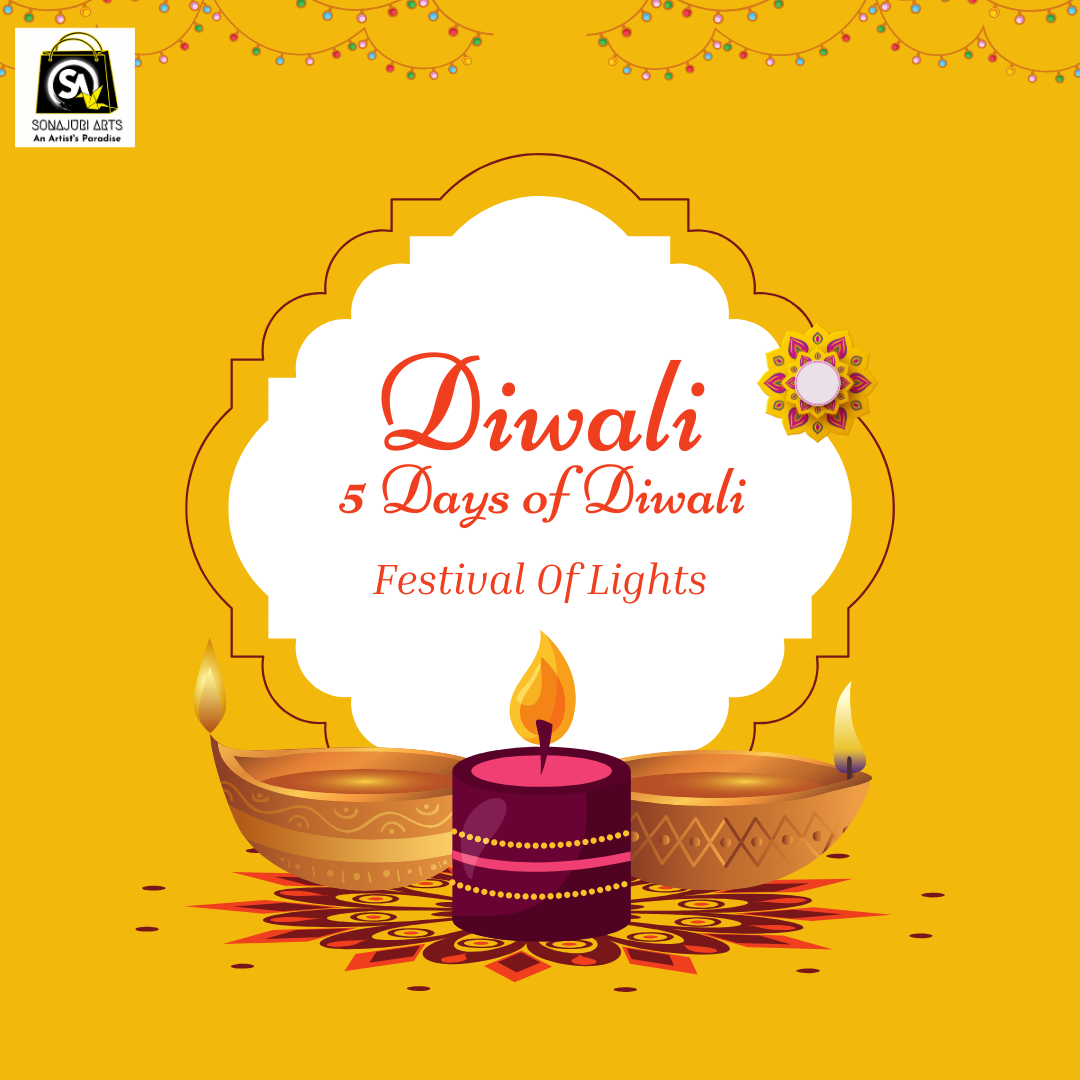Currently Empty: ₹0.00

Five Days of Diwali
Diwali, often referred to as the “Festival of Lights,” is one of India’s most cherished and eagerly anticipated celebrations. Observed by millions worldwide, Diwali symbolises the triumph of light over darkness, good over evil, and knowledge over ignorance. Typically falling between October and November, this festival carries profound cultural, spiritual, and social significance. This year, the Diwali festival will be celebrated on 31st October 2024.
5 Days of Diwali: Meaning and Significance
Diwali is celebrated over five days, with each day holding its own special meaning and cultural significance. Here’s a look at what each day represents:
Day #1 Dhanteras: Welcoming Wealth and Prosperity
The festival begins with Dhanteras, dedicated to health and wealth. On this auspicious day, devotees worship Lord Dhanvantari, the god of medicine, and Goddess Lakshmi, the goddess of wealth. It’s considered propitious to purchase gold, silver, and utensils, symbolising the promise of prosperity for the year ahead. Homes are thoroughly cleaned and adorned with diyas to invite blessings.
Significance: This day highlights the importance of health, wealth, and well-being, as families prepare for the joyful celebrations to come.
Day #2 Naraka Chaturdashi (Choti Diwali): Triumph Over Evil
The second day, Naraka Chaturdashi, also known as Choti Diwali, commemorates Lord Krishna’s victory over the demon Narakasura, symbolising the triumph of good over evil. Many observe this day by taking an early morning oil bath—a tradition believed to purify body and soul. Homes are decorated with rangoli, and small diyas are lit to attract positive energy.
Significance: This day encourages the dispelling of negativity and prepares individuals for new beginnings.
Day #3 Lakshmi Puja (Main Diwali): Celebrating Prosperity
The third day is the heart of Diwali, devoted to performing Lakshmi Puja. Families offer prayers for prosperity, happiness, and wealth, illuminating their homes with diyas, candles, and decorative lights. Fireworks brighten the night sky, sweets are shared, and rangoli adorns doorways. This vibrant day captures the essence of joy and festivity.
Significance: Lakshmi Puja marks the pinnacle of Diwali celebrations, as families seek blessings for abundance and fortune.
Day #4 Govardhan Puja: Gratitude and Devotion
The fourth day, Govardhan Puja or Annakut, honours Lord Krishna’s miraculous protection of villagers by lifting the Govardhan Mountain. People prepare elaborate vegetarian feasts, offer prayers, and create symbolic mounds representing the mountain. In some regions, this day also celebrates the bond between married couples, known as Padva.
Significance: This day focuses on gratitude for nature’s abundance and the bond of love in marriage, reminding people of the importance of devotion and care.
Day #5 Bhai Dooj: Celebrating Sibling Bonds
The final day, Bhai Dooj, is dedicated to the special bond between brothers and sisters. Sisters pray for their brothers’ well-being while brothers present gifts in return. Ceremonial tilaks are applied to brothers’ foreheads, and aarti is performed, reinforcing familial connections and the loving nature of these relationships.
Significance: Bhai Dooj is a heartfelt celebration of sibling ties, honouring love and protective bonds through prayers and gifts.
Why Do We Celebrate Diwali?
- In Northern India, Diwali celebrates the return of Lord Rama to Ayodhya after defeating the demon king Ravana and completing 14 years of exile. His return was celebrated with the lighting of lamps and a grand homecoming.
- In Southern India, Diwali commemorates Lord Krishna’s victory over the demon Narakasura, a symbolic representation of the triumph of good over evil.
- In Western India, particularly in Gujarat, the festival marks the beginning of the new business year, symbolising new beginnings and prosperity.
- Another prominent reason for Diwali’s celebration is the worship of Goddess Lakshmi, the goddess of wealth and prosperity, who is believed to visit homes during Diwali to bless families with abundance and good fortune.
How is Diwali Celebrated in India?
Diwali is celebrated with immense enthusiasm across India, bringing families and communities together. The festivities typically include:
- Cleaning and Decorating Homes: Leading up to Diwali, people clean their homes and decorate them with colourful rangoli designs, lights, and diyas to invite prosperity and happiness.
- Puja (Worship): On the main day of Diwali, families perform Lakshmi Puja to honour Goddess Lakshmi and Lord Ganesha, seeking blessings for wealth and success.
- Feasting: Delicious sweets and festive meals are prepared and shared among family and friends, highlighting regional culinary traditions.
- Bursting Firecrackers: Fireworks light up the night sky, symbolizing the victory of light over darkness. Many people now opt for eco-friendly crackers to minimize pollution.
- Exchanging Gifts: Families and friends exchange gifts and sweets as a gesture of goodwill and love, fostering a sense of community and togetherness.
- Playing Cards: A popular tradition during Diwali involves playing card games, which adds to the festive spirit and offers a fun way to bond with loved ones.
Diwali is not just a festival of lights but also a celebration of relationships, community, and hope for a better future. It is a time when families come together, regardless of distance, to share joy, offer prayers, and celebrate the triumph of good over evil, light over darkness.
